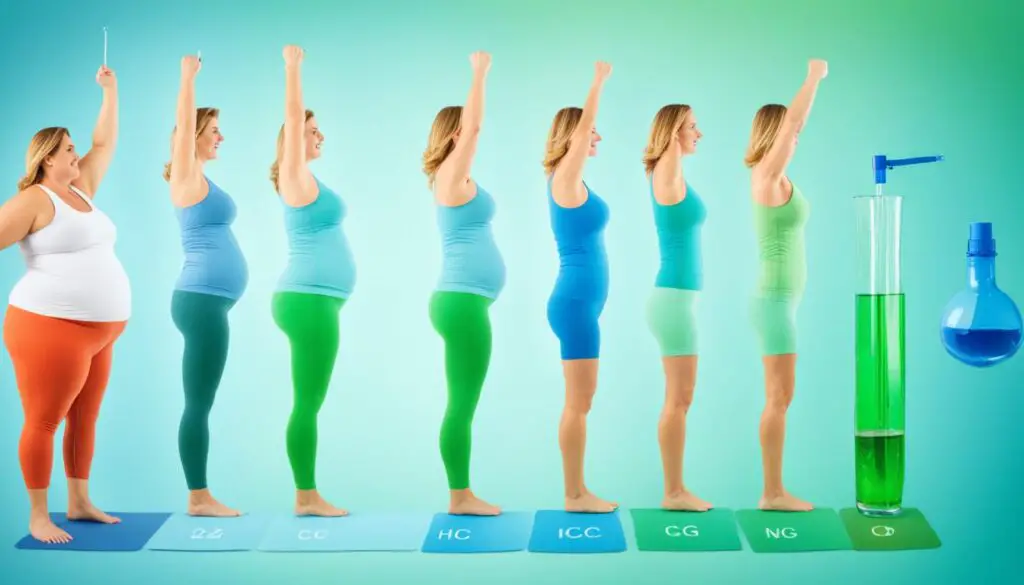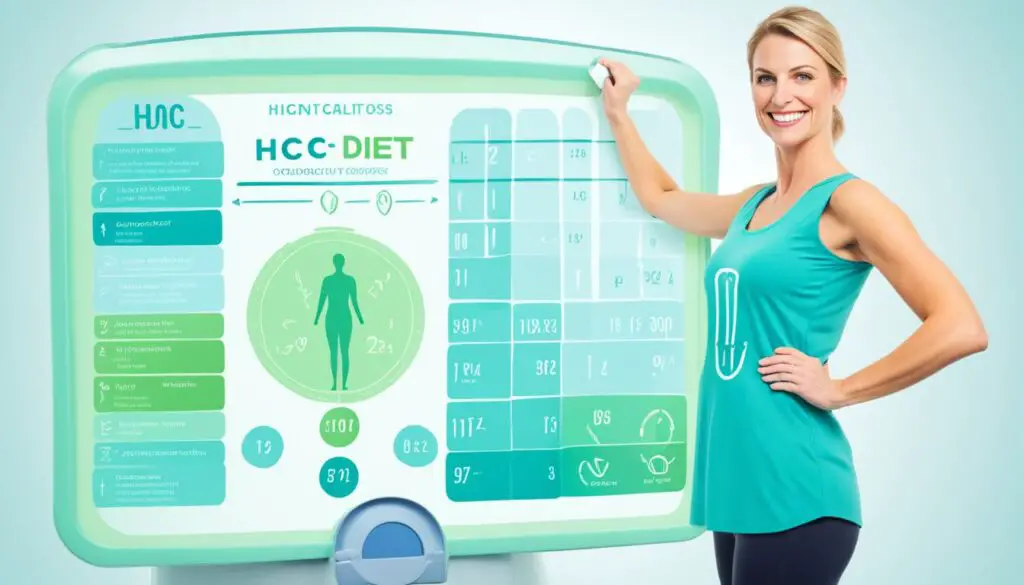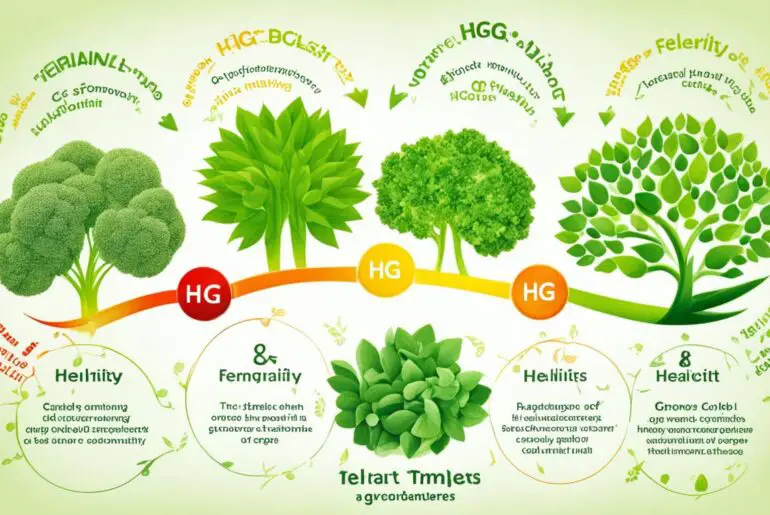Are you looking for a holistic approach to detoxification and weight loss? The HCG Diet might have caught your attention. But what exactly is the HCG Diet, and how does it work? Is it an effective weight loss program or just another fad? Let’s dive into the details and separate fact from fiction.
Key Takeaways:
- The HCG Diet combines a low-calorie diet and the HCG hormone to promote weight loss and reset eating habits.
- Scientific studies have found that the weight loss achieved during the diet is primarily due to calorie restriction, not the HCG hormone.
- The FDA does not approve HCG products for weight loss, and there are safety concerns associated with consuming a very low-calorie diet.
- Consulting a registered dietitian or healthcare provider is essential for safe and effective weight loss.
- There are evidence-based methods for weight loss that prioritize long-term health and sustainable results.
What is the HCG Diet?
The HCG Diet is a popular weight loss program that combines a very low-calorie diet with the hormone HCG (Human Chorionic Gonadotropin). This hormone is naturally produced during pregnancy and is believed to play a role in regulating metabolism.
The HCG Diet consists of three phases, each with its own guidelines and restrictions. In the first phase, known as the loading phase, individuals are encouraged to consume high-calorie, high-fat foods for two days to build up fat stores in preparation for the diet. The second phase is the weight loss phase, during which participants follow a strict 500-calorie daily diet with minimal fat intake. This is where rapid weight loss is expected to occur, with some claims suggesting up to 3 pounds per day. Finally, in the third phase, the maintenance phase, individuals gradually increase their food intake while still avoiding sugar and limiting carbohydrates.
The primary goal of the HCG Diet is to promote rapid weight loss while also balancing hormones. It is believed that the HCG hormone helps to suppress appetite, prevent muscle loss during calorie restriction, and target stubborn fat stores for energy.
However, it is important to note that the HCG Diet is not without controversy and has been met with skepticism from some healthcare professionals. Critics argue that the extreme calorie restriction of the diet is what leads to weight loss, rather than the HCG hormone itself. Additionally, the FDA does not approve HCG products for weight loss, and there are safety concerns associated with consuming such a low-calorie diet for an extended period of time.
“The HCG Diet is a popular weight loss program that combines a very low-calorie diet with the hormone HCG.”
Despite its popularity and claims of rapid weight loss, it is recommended to approach the HCG Diet with caution and seek professional guidance from a registered dietitian or healthcare provider. These professionals can help determine if the diet is suitable for individual needs and provide evidence-based recommendations for safe and effective weight loss.
| Pros | Cons |
|---|---|
|
|
How Does the HCG Diet Work?

The HCG Diet combines a low-calorie diet with the HCG hormone supplement, aiming to promote weight loss. The HCG hormone is believed to have several effects on the body that contribute to its weight loss benefits. Firstly, it is thought to improve metabolism, which can help individuals burn more calories throughout the day. Secondly, the hormone is believed to reduce hunger and cravings, making it easier for individuals to adhere to the low-calorie diet. This can help create a calorie deficit, leading to weight loss.
Although the HCG hormone is thought to play a role in weight loss on this diet, scientific studies have found that the primary cause of weight loss is the low-calorie intake. The restricted calorie consumption leads to a significant energy deficit, forcing the body to utilize stored fat for fuel. Therefore, while the HCG hormone may provide some additional benefits, the weight loss achieved during the HCG Diet is primarily a result of the calorie restriction.
Scientific studies have found that the weight loss achieved during the HCG Diet is primarily due to the low-calorie intake and not the HCG hormone itself.
Incorporating the HCG hormone into the diet plan can be seen as a way to potentially enhance weight loss. However, it is important to note that the effectiveness of the HCG Diet in promoting long-term weight loss and its impact on overall health are still subjects of debate and further research.
The Phases of the HCG Diet
The HCG Diet is a structured weight loss program that consists of three distinct phases. Each phase has specific guidelines and dietary restrictions designed to facilitate weight loss and maintain overall health. Let’s take a closer look at each phase:
Phase 1: Loading Phase
In the initial phase of the HCG Diet, often referred to as the loading phase, users are encouraged to consume high-calorie, high-fat foods for two days. This phase serves as a preparation period, allowing the body to store excess energy that will be utilized during the subsequent phases. It may seem counterintuitive to consume indulgent foods, but it helps prevent hunger and boosts energy levels as the diet progresses.
Phase 2: Weight Loss Phase
The second phase of the HCG Diet is the weight loss phase. During this phase, users follow a strict 500-calorie daily diet with minimal fat intake for a duration of three to six weeks. This low-calorie restriction, combined with the HCG hormone, helps promote rapid weight loss. It is important to adhere to the prescribed meal plan and consume the recommended foods to ensure optimal results. Table: Recommended Foods during the Weight Loss Phase
| Food Category | Recommended Foods |
|---|---|
| Protein | Lean meat (chicken, turkey, fish), egg whites |
| Vegetables | Spinach, lettuce, cucumbers, tomatoes |
| Fruits | Apples, strawberries, oranges |
| Grains | Melba toast, rice cakes |
Phase 3: Stabilization Phase
The third phase of the HCG Diet is the stabilization phase. In this phase, users gradually increase their food intake while avoiding sugar and limiting carbohydrates. Emphasis is placed on maintaining weight loss and stabilizing the body at the new weight. It is crucial to reintroduce foods slowly to prevent weight regain and maintain the benefits of the diet. Sticking to healthy eating habits and portion control is essential during this phase.
The phased approach of the HCG Diet allows individuals to experience significant weight loss while resetting their eating habits. It is important to note that the HCG Diet should only be undertaken with proper medical supervision to ensure safety and maximize results.
Is the HCG Diet Effective for Weight Loss?

Scientific studies have consistently found the HCG Diet to be ineffective for weight loss. The weight loss achieved during the diet is primarily due to the low-calorie intake and not the HCG hormone supplement. The FDA does not approve HCG products for weight loss, and there are serious risks and safety concerns associated with consuming an extremely low-calorie diet. It is recommended to consult with a registered dietitian or healthcare provider for safe and effective weight loss methods.
The Science Behind HCG Diet Effectiveness
Scientific studies have extensively researched the effectiveness of the HCG Diet in achieving weight loss. These studies have consistently shown that the weight loss experienced during the diet is primarily a result of the severely restricted calorie intake, typically ranging from 500 to 800 calories per day. The low-calorie diet leads to a significant calorie deficit, which in turn promotes weight loss. In contrast, the HCG hormone supplement has not been found to have a significant impact on weight loss.
Research has shown that the HCG hormone, when used in conjunction with a low-calorie diet, does not provide any additional benefits in terms of weight loss compared to following a low-calorie diet alone. The weight loss achieved during the HCG Diet can be attributed to the calorie restriction rather than the hormone itself.
Risks and Safety Concerns
While the HCG Diet may promise rapid weight loss, it comes with various risks and safety concerns. One of the main concerns is the extremely low-calorie intake, which can lead to nutrient deficiencies, fatigue, muscle loss, and a weakened immune system. Consuming such a low-calorie diet for an extended period can also have long-term negative effects on metabolism and overall health.
Additionally, the use of HCG hormone supplements for weight loss is not approved by the FDA. The FDA has cautioned against the use of HCG products for weight loss due to the lack of scientific evidence supporting their effectiveness and safety. Unauthorized use of HCG products can expose individuals to potential health risks without the necessary oversight and regulation.
Seeking Professional Guidance
Given the lack of scientific evidence and the potential risks associated with the HCG Diet, it is highly recommended to seek professional guidance before embarking on any weight loss program. Consulting with a registered dietitian or healthcare provider can provide personalized advice and support to develop a safe and effective weight loss plan tailored to individual needs.
These professionals have the knowledge and expertise to guide individuals toward evidence-based weight loss strategies that prioritize long-term health and sustainability. They can help create a balanced and nutritious meal plan, provide strategies for behavior change, and monitor progress to ensure safe and effective weight loss.
Remember, it is crucial to prioritize your health and well-being when considering any weight loss program, and consulting with a healthcare professional is always the best approach.
| Pros | Cons |
|---|---|
|
|
Risks and Safety Concerns
The HCG Diet entails consuming an extremely low amount of just 500 calories per day for a period of three to six weeks. This severe calorie restriction poses significant risks and safety concerns for individuals undertaking the diet.
It is important to note that the U.S. Food and Drug Administration (FDA) disapproves of the use of HCG products for weight loss. In fact, the FDA is actively working towards removing all HCG products labeled for weight loss from the market. The use of these products without FDA approval is considered off-label, which means they are being used for purposes other than what they are approved for. This increases the risk of using HCG products without sufficient safety and efficacy information.
Prior to starting the HCG Diet, it is crucial to be fully aware of these risks and safety concerns. Consulting with a healthcare professional, such as a registered dietitian or primary care physician, is highly recommended. These professionals can provide personalized guidance based on your specific health needs and help you make an informed decision about whether the HCG Diet is appropriate for you.
Key Safety Concerns:
- Extreme low-calorie intake
- Insufficient nutrient intake
- Potential muscle loss
- Metabolic slowdown
- Decreased energy levels
- Dizziness and fatigue
- Electrolyte imbalances
- Health conditions worsen
- Lack of long-term sustainability
It’s crucial to prioritize your health and well-being when considering any weight loss program. The risks associated with the HCG Diet should not be taken lightly, and consulting with a healthcare professional is essential.
HCG Diet and Its Controversy

The HCG Diet has sparked controversies due to the lack of scientific evidence supporting its claims and the FDA’s disapproval of HCG products for weight loss. Despite claims of rapid weight loss and hormone balancing, there is insufficient scientific research to substantiate these assertions.
“There is no substantial evidence to support the use of HCG for weight loss.”
– FDA
The FDA has taken action against companies and retailers selling over-the-counter HCG products labeled as “homeopathic for weight loss” without proper FDA approval. This move highlights the concerns surrounding the safety and effectiveness of the HCG Diet.
It is crucial to rely on safe and scientifically proven methods for weight loss. Consulting with healthcare professionals, such as registered dietitians or healthcare providers, can provide valuable guidance and ensure a personalized weight loss approach tailored to individual needs.
Controversies Surrounding the HCG Diet
- The lack of scientific evidence supporting the claims of rapid weight loss and hormone balancing.
- The FDA’s disapproval of HCG products for weight loss due to safety concerns.
- Action taken by the FDA against companies and retailers selling over-the-counter HCG products labeled as “homeopathic for weight loss” without proper FDA approval.
When it comes to weight loss, it is essential to choose methods that are backed by scientific research and ensure the guidance of healthcare professionals to prioritize safety and effectiveness.
Seek Professional Advice for Effective Weight Loss

To achieve effective and safe weight loss, it is crucial to seek professional guidance from a registered dietitian or healthcare provider. These experts have the knowledge and experience to provide personalized recommendations and evidence-based methods for weight loss.
Consulting with a professional will ensure that your weight loss journey is tailored to your individual needs and goals. They can help you develop a comprehensive plan that includes a balanced diet, regular exercise, and healthy lifestyle habits.
Registered dietitians are trained to assess your current eating habits, nutritional needs, and medical history to create a customized weight loss program. They will consider your preferences, food sensitivities, and any underlying health conditions to provide the most effective and sustainable approach.
In addition to providing guidance, registered dietitians can also offer ongoing support and accountability. They can help you overcome common obstacles, such as managing cravings, emotional eating, and maintaining long-term weight management.
The Importance of Professional Guidance
Embarking on a weight loss journey without professional guidance can lead to potential risks and ineffective results. Fad diets, like the HCG Diet, may promise rapid weight loss, but they often lack scientific evidence and can be detrimental to your health.
“Seeking professional advice ensures that your weight loss approach is safe, effective, and tailored to your specific needs.”
A registered dietitian or healthcare provider can help you differentiate between evidence-based weight loss strategies and gimmicks. They can guide you towards proven methods like portion control, mindful eating, and gradual, sustainable changes to your lifestyle.
Remember, effective weight loss is not just about shedding pounds quickly. It’s about making sustainable lifestyle changes that promote overall health and well-being.
Consult a Registered Dietitian or Healthcare Provider Today
If you’re ready to embark on a weight loss journey, don’t go it alone. Seek professional guidance from a registered dietitian or healthcare provider who can provide the expert support, knowledge, and resources you need to succeed.
Don’t let fad diets or misleading promises steer you in the wrong direction. Choose a trusted professional who can help you achieve your weight loss goals safely and effectively.
| Benefits of Professional Guidance: |
|---|
| Personalized weight loss plan tailored to your needs |
| Evidence-based methods for safe and effective weight loss |
| Expert support and accountability throughout your weight loss journey |
| Guidance on overcoming common obstacles and maintaining long-term weight management |
Conclusion
The HCG Diet, a popular weight loss program that claims to promote hormone detoxification and rapid weight loss, lacks scientific evidence to support its effectiveness. This diet involves consuming a dangerously low amount of calories and relies on a hormone supplement without FDA approval for weight loss. It is crucial to be aware of the risks and safety concerns associated with the HCG Diet.
To ensure safe and effective weight loss, it is highly recommended to seek professional guidance from registered dietitians or healthcare providers. These experts can provide evidence-based and personalized advice tailored to individual needs. Consulting with professionals not only reduces the risks associated with fad diets like the HCG Diet but also ensures a holistic approach to weight loss.
When it comes to hormone detoxification and achieving sustainable weight loss, it is important to rely on scientifically proven methods and seek professional guidance for optimal results. A registered dietitian or healthcare provider can offer comprehensive support, helping individuals adopt a balanced and healthy lifestyle that promotes long-term success. Prioritizing professional guidance is key to achieving safe and effective weight loss without compromising overall health and well-being.
FAQ
What is the HCG Diet?
The HCG Diet is a weight loss program that combines a very low-calorie diet with the hormone HCG. The diet is divided into three phases, with each phase having its own set of rules and restrictions on what can be eaten. The goal of the diet is to promote rapid weight loss while also balancing hormones.
How does the HCG Diet work?
The HCG Diet works by combining a low-calorie diet with the HCG hormone supplement. The hormone is believed to improve metabolism and help users burn more calories. It is also thought to reduce hunger and cravings, making it easier to stick to the diet. However, scientific studies have found that the weight loss achieved during the diet is primarily due to the low-calorie intake and not the HCG hormone itself.
What are the phases of the HCG Diet?
The HCG Diet is divided into three phases. During the first phase, users consume high-calorie, high-fat foods for two days to prepare their bodies. The second phase involves following a strict 500-calorie daily diet with minimal fat intake for three to six weeks. The third phase allows users to gradually increase their food intake while avoiding sugar and limiting carbohydrates. Each phase has specific recommended foods to be consumed.
Is the HCG Diet effective for weight loss?
Scientific studies have consistently found the HCG Diet to be ineffective for weight loss. The weight loss achieved during the diet is primarily due to the low-calorie intake and not the HCG hormone supplement. The FDA does not approve HCG products for weight loss, and there are serious risks and safety concerns associated with consuming an extremely low-calorie diet. It is recommended to consult with a registered dietitian or healthcare provider for safe and effective weight loss methods.
What are the risks and safety concerns of the HCG Diet?
The HCG Diet involves consuming a dangerously low amount of 500 calories daily for three to six weeks, which can lead to serious risks and safety concerns. The FDA disapproves of HCG for weight loss and is actively working to have all HCG products labeled for weight loss removed from the market. Off-label use of HCG products without FDA approval increases the risk of using these products without sufficient safety and efficacy information. It is important to be aware of these risks and consult with a healthcare professional before starting the HCG Diet.
What is the controversy surrounding the HCG Diet?
The HCG Diet has faced controversy due to its lack of scientific evidence and FDA disapproval. The diet’s claims of rapid weight loss and hormone balancing have not been substantiated by scientific studies. The FDA has taken action against companies and retailers selling over-the-counter HCG products labeled as “homeopathic for weight loss” without FDA approval. It is important to rely on safe and scientifically proven methods for weight loss and consult with healthcare professionals for guidance.
Should I seek professional advice for effective weight loss?
To achieve effective and safe weight loss, it is recommended to seek professional advice from a registered dietitian or healthcare provider. These professionals can provide personalized guidance and recommend evidence-based methods for weight loss. Consulting with professionals ensures that the weight loss approach is tailored to individual needs and avoids potential risks associated with fad diets like the HCG Diet.




